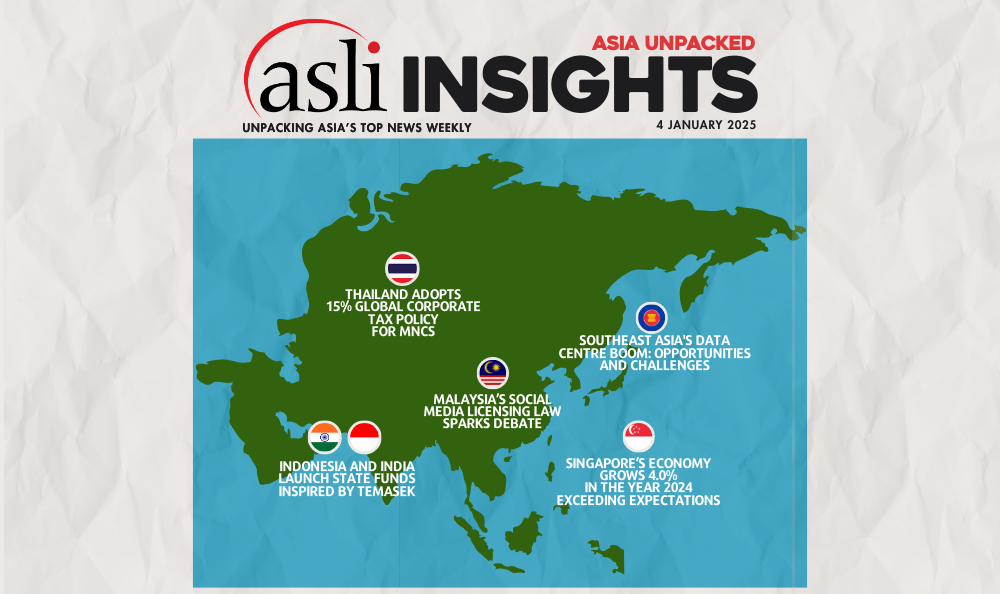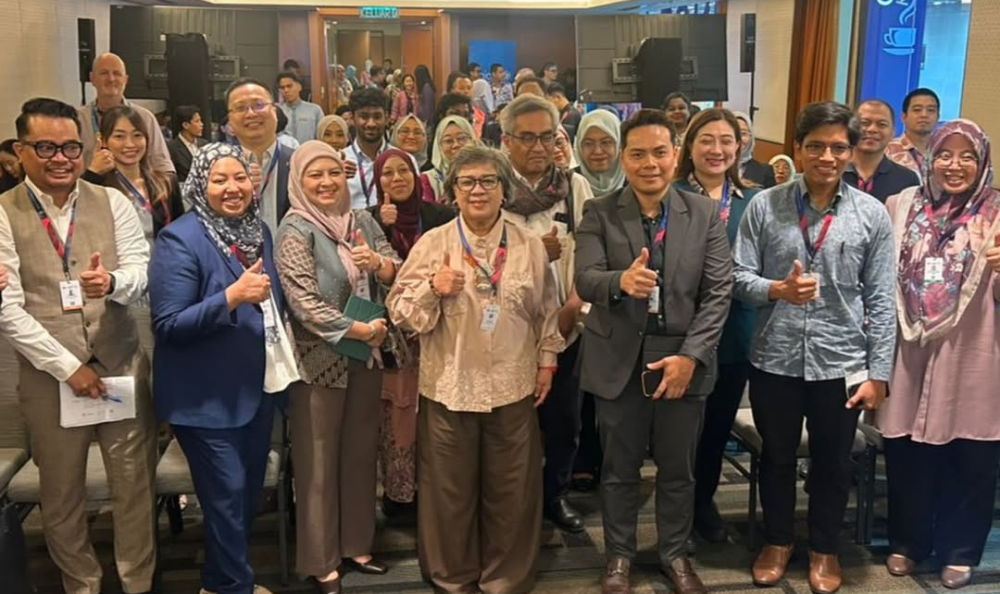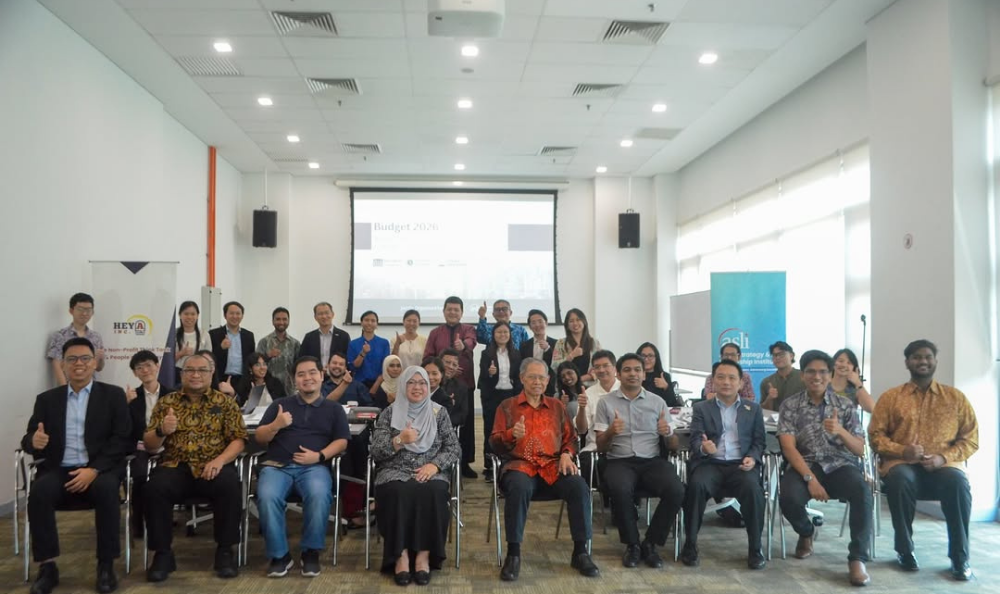
ASLI INSIGHTS: Asia Unpacked | 4 January 2025
🌏 Malaysia’s new social media law raises concerns, Southeast Asia’s data centre boom sparks debates, Thailand adopts a global tax policy, and Singapore’s economy surprises with growth while India and Indonesia draw inspiration from Singapore’s Temasek.
This week’s Asia top news 🗞:
1) Malaysia’s Social Media Licensing Law Sparks Debate
As of 1 January 2025, Malaysia mandates social media platforms with more than eight million users to secure operating licences. This regulation aims to combat growing cybercrimes, including online scams, cyberbullying, and the sexual exploitation of children. Prominent Chinese platforms WeChat and TikTok have complied with the law, demonstrating their willingness to align with Malaysia’s efforts to regulate digital spaces. However, X (formerly Twitter) has yet to apply, claiming its user base in Malaysia is below the regulatory threshold, a statement currently being reviewed by the Malaysian Communications and Multimedia Commission (MCMC). Similarly, Google’s YouTube has raised concerns about the impact of this requirement on its video-sharing services and has not applied for a licence. In contrast, Meta, the owner of Facebook, Instagram, and WhatsApp, has started the licensing process, while Telegram is close to finalising its approval. Non-compliant platforms may face investigations and regulatory actions by the MCMC.
Read more:
- https://www.scmp.com/week-asia/politics/article/3293048/google-musks-x-miss-malaysias-social-media-licence-deadline-chinas-wechat-tiktok-comply
- https://www.theedgemarkets.com/article/malaysias-licensing-requirement-social-media-operators-divides-opinion
2) Southeast Asia’s Data Centre Boom: Opportunities and Challenges
Southeast Asia is experiencing a surge in data centre investments, driven by the increasing demand for cloud services and AI applications. Countries like Malaysia, Indonesia, and Thailand are attracting significant investments from tech giants such as Google, Microsoft, and Amazon Web Services. For example, Google announced a $2 billion investment to establish its first data centre in Malaysia, enhancing cloud and AI capabilities in the region. However, this rapid expansion faces challenges, including limited land availability, high energy consumption, and environmental concerns. Singapore, previously a leading data centre hub, imposed a moratorium on new data centres in 2019 due to sustainability issues, prompting neighbouring countries to capitalise on the opportunity. Malaysia’s Johor state, for example, has seen a boom in data centre projects, positioning itself as a regional digital hub. Despite the influx of investments, the industry must address sustainability challenges. Data centres are energy-intensive, and their expansion could strain local resources and contribute to environmental degradation. Implementing green technologies and sustainable practices is crucial to ensure long-term growth.
Read more:
- https://www.channelnewsasia.com/asia/focus-southeast-asia-data-centres-ai-hot-market-investments-limits-4816111
- https://www.businesstimes.com.sg/technology/southeast-asia-data-centre-boom-attracts-global-investment
3) Thailand Adopts 15% Global Corporate Tax Policy for MNCs
Thailand will implement a global minimum corporation tax rate of 15% starting 1 January 2025, aligning with the OECD's Global Minimum Tax framework. This tax will apply to multinational corporations with annual global revenues exceeding €750 million. Although Thailand's standard corporation tax rate is 20%, numerous businesses benefit from tax exemptions and incentives offered by the Thailand Board of Investment (BOI), with some exemptions lasting up to 13 years. To alleviate concerns among foreign investors, the Thai government is introducing compensatory measures. These include incentives for companies relocating research and development to Thailand or adopting environmentally sustainable practices. This strategy ensures Thailand remains attractive to global enterprises while complying with international tax standards. Thailand joins other Southeast Asian nations, including Malaysia, Indonesia, Singapore, and Vietnam, in adopting the 15% minimum tax rate by 2025. This move is seen as a step towards creating a level playing field for multinational corporations globally.
Read more:
- https://asia.nikkei.com/Economy/Thailand-to-apply-15-global-minimum-corporate-tax-in-2025
- https://www.bangkokpost.com/business/2546813/thailand-to-impose-15-global-tax-minimum
4) Indonesia and India Launch State Funds Inspired by Temasek
Indonesia and India are both planning to establish state-backed investment funds, inspired by Singapore's Temasek, to optimise state assets and stimulate economic growth. In Indonesia, President Prabowo Subianto announced the creation of the Daya Anagata Nusantara Investment Management Agency (Danantara) in October 2024. This agency will manage and consolidate state investments across key sectors such as banking, telecommunications, construction, and mining. The initiative aims to streamline the operations of state-owned enterprises (SOEs) and attract private-sector participation. Muliaman Hadad, former head of the Financial Services Authority, has been appointed to lead Danantara. While the move promises to enhance economic development, concerns about political interference and the need for strong governance and transparency have been raised. Similarly, India is exploring the establishment of a sovereign wealth fund focused on foreign infrastructure projects. The government is in discussions with institutions like the Reserve Bank of India and the Securities and Exchange Board of India to assess feasibility. This initiative reflects a broader trend in Asia, with countries such as Indonesia, Malaysia, and the Philippines creating sovereign wealth funds to boost infrastructure investment and overall economic growth. Both countries' efforts to emulate Temasek’s success depend on effective governance frameworks, transparency, and mitigating political influences to attract investors and ensure long-term growth.
Read more:
- https://asia.nikkei.com/Business/Finance/Indonesia-India-plan-state-backed-funds-eyeing-Temasek-success
- https://www.reuters.com/article/india-indonesia-sovereign-funds-idUSKBN31W0AO
5) Singapore’s Economy Grows 4.0% in 2024, Exceeding Expectations
Singapore's economy grew by 4.0% in 2024, according to preliminary estimates, marking a positive rebound after facing slower growth in previous years. The growth rate exceeded expectations and highlighted the country’s resilience despite global economic challenges. Key contributors to the economic performance included strong performances in the manufacturing, services, and construction sectors, which helped boost overall output. The manufacturing sector saw a boost from robust demand in the electronics and biomedical industries, with Singapore continuing to benefit from its position as a global hub for high-tech industries. The services sector also showed strong growth, particularly in finance, insurance, and real estate, which continued to drive investment and job creation. The construction sector experienced recovery as projects previously delayed by the pandemic resumed, with rising demand for infrastructure projects. Additionally, the export-driven economy remained competitive, benefiting from a strong global demand for goods and services. Despite uncertainties such as inflationary pressures and global economic slowdowns, Singapore’s diversified economy allowed it to maintain stability and growth. The positive outlook for 2024 also laid the foundation for further expansion in the coming years. Moving into 2025, the country aims to continue leveraging technological advancements and global trade to sustain its economic momentum.
Read more:
- https://www.thestar.com.my/business/business-news/2025/01/02/singapore-economy-grew-40-in-2024-advance-estimate-shows
- https://www.todayonline.com/singapore/economy-grows-40-2024-expected-outperform-forecasts
Empowering Leaders, Advancing Societies.




